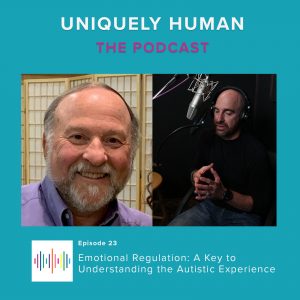
EPISODE 23
Emotional Regulation: A Key to Understanding the Autistic Experience
Emotional Regulation: A Key to Understanding the Autistic Experience
Play the Episode…
…and Continue the Discussion
Do you have a book or podcast club? If so, you may use this discussion guide to facilitate a conversation about this episode.
1) There are many factors that cause dysregulation for autistic people. What are some of these factors? As an autistic person, professional or family member, which factors have been most prominent in your life. What has been most helpful in mitigating the impact of those factors?
2) What are some of the challenges in emotional regulation shared by Dave? What does Dave say about what has been helpful for him?
3) The dichotomy of self and mutual regulation is essential to understanding emotional regulation. What are some examples of strategies for self-regulation and mutual regulation? How does this breakdown help to develop a deeper understanding of behavior observed in autism, that previously has been viewed through the lens of pathology?
Show Notes
Challenges in emotional regulation, and appropriate supports and plans to address those challenges are among the most important aspects of the autistic experience. This concept was first introduced to autism in publications by Barry and his colleagues in 1990, and then as a core domain in the SCERTS Model framework in 2000. Barry and Dave discuss critical issues in emotional regulation, including self- and mutual regulation, and levels of support appropriate for persons of different abilities. Dave provides insights into issues he experiences with emotional regulation, and what has proven helpful for him.